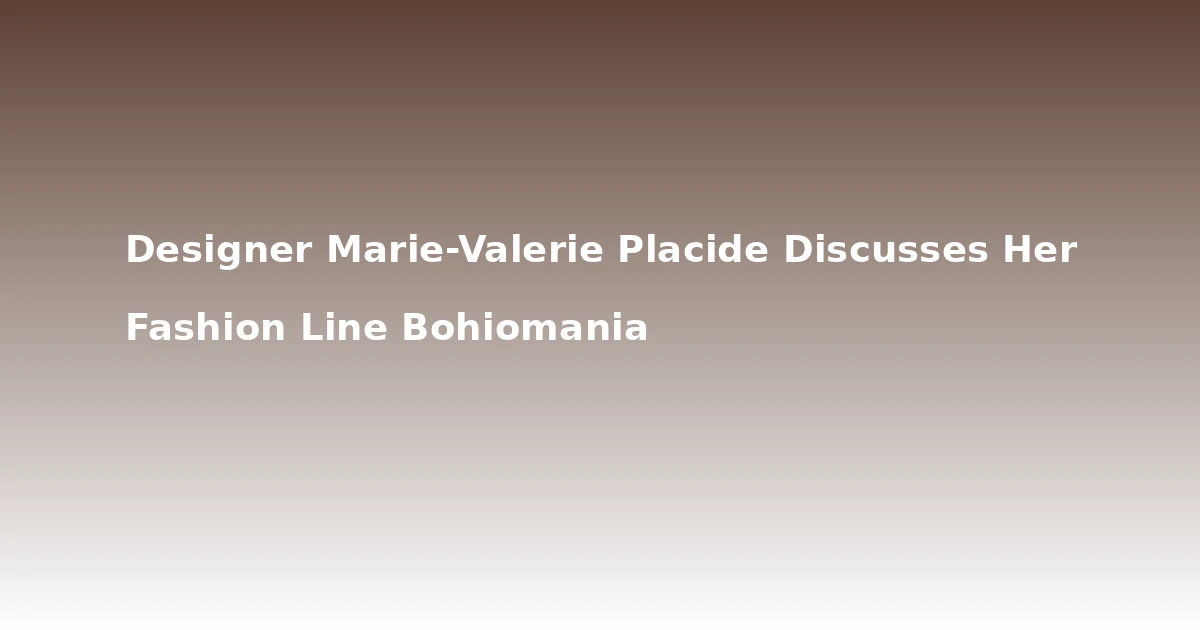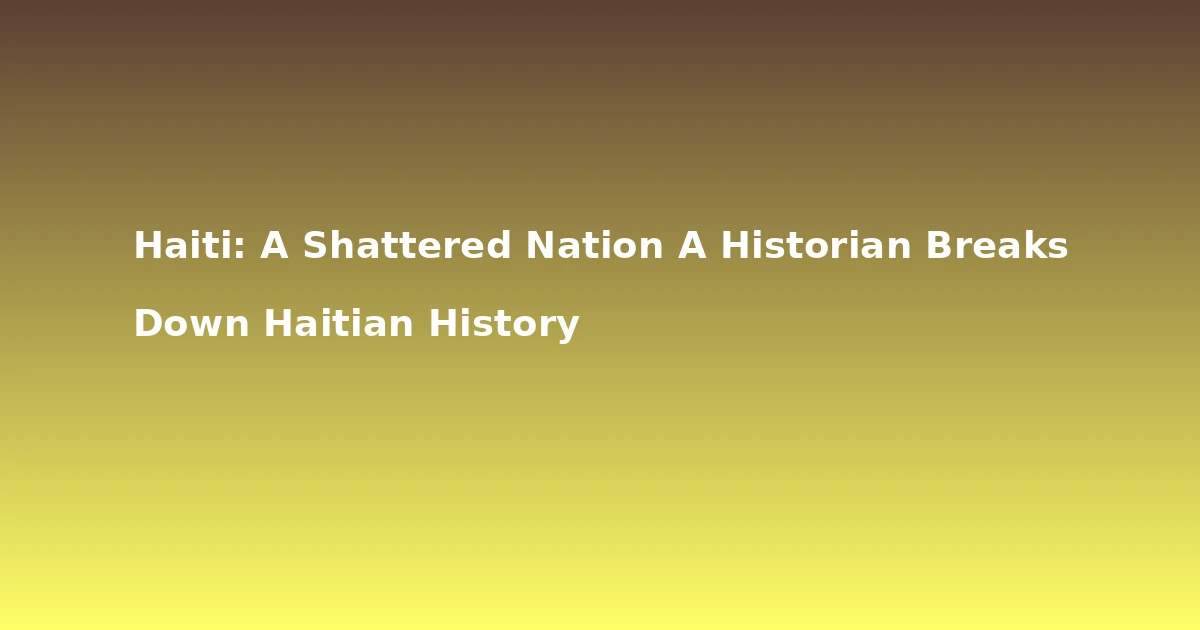Marilene Phipps is just as fond of her paint brush as she is of her pen. She creates color-popping, religious-themed paintings. But she also dabbles in literature, and has written two collections of short stories—including the award-winning and critically-lauded In the Company of Heaven: Stories from Haiti—in addition to countless pieces of poetry.
Behind every artist, and certainly behind every writer, there is an individual. Marilene Phipps-Kettlewell let us in into her world, as she reminisced about her birthplace, writing, and the short story.
Is there a story behind the last name, Phipps?
The first Phipps in Haiti was James Phipps. It is said that he may have come as part of the English army trying to get a piece of the colony at the time, but liked the island, and stayed. He was one of the first foreigners to have been naturalized Haitian in 1805 by Jean-Jacques Dessalines himself.
My grandfather, Jules Phipps, was the first of his generation to settle in Port-au-Prince. The Phipps family came from Les Cayes in whose cemetery there are many Phipps’s graves.
After 1804, many foreigners, adventurers, or people fleeing their countries for economic or political reasons, started to come and settle in Haiti—Germans, French, Polish, Sephardic Jews, Lebanese, Chinese, Indians etc… My mother’s family was one such immigrants—French people running from their own revolution. My great-grandmother, on my mother side, was born in Les Cayes where her parents had plantations. She was married at 16 to a Frenchman, left for France with him, and never returned to Haiti.
She however kept ties with Haiti through family and friends. My parents met each other though common friends from Haiti at a time when my father had traveled to France for a brief visit.
You left Haiti when you were a pre-teen. What do you remember of your time there, in those days, before your departure, your childhood and all?
Even though I was born and grew up in Port-au-Prince, my memories are of a rural Haiti, not of a city life. I felt close to the land, the people of the land, and the animals of the land—goats, donkeys, bulls, chicken, and of course, my dogs.
I longed for them all when I was away in France, sent to school there at 11 to escape the Duvalier era and the danger to my life. I grew up with constant curfews and news of massacres. Political reprisals were fierce and random.
Men of every generation of my family had been involved in politics or education. In the early 1960’s, my cousin and godfather, Guslé Villedrouin, leader of the group Jeune Haiti that attempted to overthrow Papa Doc in 1964, was getting involved as well. His mother is a Phipps—he was the new generation of Phipps.
He willingly risked and gave his life for the people of Haiti, for a kind dream of equality, justice, and peace for all. He was 24.
I was an adolescent in France when he called to say goodbye before the group were to go and land in Haiti, in Dame Marie. I was choked with tears even though I was unaware of the reasons for his call, and could not say a word to him. He only took the sound of my tears away with him, while I still remember his voice.
In all my years in France, I suffered from nostalgia for my country. I yearned for the warmth of the people and the island, for a singular kindness and compassion that then had survived any past historical and present, social inequality and violence; I missed the beauty of big skies, palm trees swaying in the big blue above, malfini birds—eagles—flying high, the generosity and breadth of the vegetation, from malanga leaves below, to breadfruit tree leaves higher up, zabriko trees, mango trees, thick, strong, brown, scarred tree trunks, and the calm induced by the sound of rain falling on that generous green canopy all around me.
What I wrote as an introduction to my collection, The Company of Heaven: Stories from Haiti, published by the University of Iowa Press, still could answer your question best, and reveals what has marked me, and remains with me: “The stories will take you to Haiti—a lush, singular, lyrical, flamboyant and spirit-filled Haiti—and keep you there. You will be charmed by a rare tapestry of people who move through an exotic landscape, caught in the mysterious complexities of their inner world. Still, they are people who dream of escape.
Some of them may achieve that escape, either through spectacular fantasies, bargaining with God, joining the boat-people, surrendering to madness, or to love, pure and all-encompassing. Even if each story stands by itself, some characters are woven throughout and inhabit many of them; they can be followed from one story to another. In this way, the collection could be read as one story, the story of people trapped in a personal and cultural drama, and the need for survival within a rigorously class-determined society fraught with the challenging rules of Caribbean class and culture.”
The artist as a child. Photo Credit: Subject’s private collection.
When did you first go back?
I was getting so anemic in France, and was so depressed that my parents brought me back to Haiti for one year—to fatten and warm me up. That was the year 1964. So, as fate had it, I was there when my cousin was killed and beheaded, and when the photo of his head made it to the front page of the Haiti newspaper.
That is how we learnt of his death. I was also there when [Ardouin] Numa and [Louis] Drouin, two of my cousin’s companions in the Jeune Haiti attempted coup, were made the puppets of a televised, public execution in front of the Port-au-Prince cemetery. Unbeknownst to my parents, I watched it the day of, and every day of the week during which it kept on being broadcasted.
They were my only link to my cousin. I felt that they held a part of him in them. I was fascinated by the moment of death, when the head tilts to the side, and the body slackens.
What was it like when you arrived in the United States?
I was a young bride of nineteen, married to an American. I spoke no English although I could read some from having studied it at school in France. I had a strong grammatical base that had been burnt into me through the demanding, competitive French school system.
I was in El Paso, Texas, at the Mexican border. I loved the desert, the Indian culture, and country music.
When did you go back again? What were your impressions?
I went back one year or so later. My father would send me a plane ticket regularly thereafter.
My then-husband and I were young and had no money. Haiti was home. It was always hard to leave, but I had to. Something inside me was running away when I first got married, and still is.
Do you go there very often now?
During the whole kidnapping period, I refrained from going home. My father had passed, and my mother depended on me. I could not afford to get kidnapped.
Because of my light skin color I am highly visible, and was highly “desirable” by kidnappers. My mother would beg me not to come. I go more often now.
Since the earthquake however, my Port-au-Prince childhood landscape and personal landmarks is completely gone. All has collapsed.
Your poetry has won the prestigious Grolier Prize as well as the Crab Orchard Poetry Prize. Where do you get most of the inspiration for your poems?
For the [prize-winning] poems that you mention, Haiti was the inspiration. Read them and—you’ll see—it is Haiti and its people.
It is my love for it all. Presently, my poems have enlarged to encompass the larger humanity to which we belong, the universal aspects of our human journey, and more mystical themes revolving around direct experience and feel for the divine realm, God at its center. Having grown up in the Port-au-Prince neighborhood of Turgeau, my house very near the grotto of the Immaculate Conception, I have a forever enduring tenderness and relationship with her too.
You’ll see my paintings also have increasing religious themes, whereas before it was more animals and landscapes of Haiti; a lot of mountains and graveyards. I paint icons.
Waiting,” one of your paintings depicts…?
My mother. And her own forever longing for her father, her childhood in France, all that she misses, has lost, regrets, loves empty. In the background is a portrait of my brother—it is the classic painting-in-a-painting theme, while the deep theme is the longing, in her, in us, in the human condition.
I could now ask you: “of all my paintings shown in my website, why did you single out this one? Is there a universal emotion, or a Caribbean condition, that you are subliminally sensitive to, and perceive here? This is one of my finest paintings but not the most “Haitian,” or the most spectacular. Yet it touched you most—the one about longing.
In , you’ve inferred that some Haitians tend to question your “Haitianness” at first glance.
Ah yes… the old color question continues to contaminate our relationships to each other in Haiti, and we may even use it for reverse discrimination. Fair enough, I suppose. Wherever I go, people ask me where I am from.
French people too. No country wants to claim me unreservedly. I wonder if Jacques Roumain, Marie Vieux, Lilas Desquiron, Gary Klang, suffered that indignity too?
By the way, I am related to Jacques Roumain, and the Roumain family, by my father’s mother. When I was a student of anthropology at Berkeley University, CA, I went to Haiti to do studies of market relations. However friendly, welcoming and all, and however good my Kreyòl sounded, the market women would never believe that I am Haitian.
When I compared myself, one day, to another of their pratik—customer—who was as light-skinned as I am but who they accepted as Haitian, and asked them “why is she Haitian, and I not?” they replied, “Bwa nen w!——your nose’s bone structure” and yes, my nose is indeed long and straight, a genetic coincidence that people keep on using to rob me of my cultural identity and appurtenance. And yet, we keep forgetting that the Caribbean are a culture of contact—the true Caribbean is a mixture, and belongs to a mix of races, and even of lands, is what defines us.
Were any of the stories in your award-winning short story collection The Company of Heaven inspired by happenings in real life?
Of course. I don’t remember who said first that, “All fiction is autobiographical.” Maybe not all autobiographical, but inspired, stimulated, by real life; a re-shuffling of events and people is also done by the imagination.
It is best not to try and sort it all out—the real from the imagined—but enjoy the flavor and power of the new cocktail, because it has more meaning than “real” life—it is meaning extracted, condensed, analyzed, purified out of the void of the ill-lived or the forgotten.
As someone who is both a painter and a writer, do you sometimes create a painting just to help you flesh out a story… or write a story just to aid you in the creation of a painting?
Never. But it has happened in the past, although very rarely, that a poem may be born of a painting that I contemplated after it was done—finding inspiration in a poetic moment, or area, in a painting; trying to articulate and describe that moment with words rather than form and color. For example, imagine that I would contemplate that painting you mentioned, “Waiting,” and let the dream evoked in me by, say, the expression in the eyes of the mother, carry me from the present moment to an other moment, another place, another person even. I think that the poet Keats, when speaking of “negative capability,” spoke of that process that may be happening in me when I have taken an area of a painting, or a mood of a painting, and let it carry me to another inner realm where words reign with power of expression.
You write in English, but as someone who spent time in Haiti during the early years of her life, you were educated in a French environment. Do you think, as time goes by, that more writers will write in Creole and English, and less in French?
Tough question. I am not versed enough in what is going on in education in Haiti to be in a position to give you an informed answer.
What I can say however is that France and the US have competed for dominion over Haiti for a very long time. Let us not forget the meaning and the impact of the 19 years of American occupation of Haiti. The issue of language is tied to the issue of control, with deep ramifications to economic interests.
Who is paying who to get what is a constantly shifting game. We don’t get the truth from the news, but only what is manufactured to shape or drug public opinion. I have been told by a couple of linguists that some countries have successfully shifted to their Creole.
But Haiti is very small, depleted, demoralized, and marred by a habit of dependency. What I observe is that Haitians who speak English do so because they live abroad, and English is the language used there. French is already in Haiti but spoken comfortably by only a small minority of people educated in the French system in Haiti, people now getting old who have been sending their children for education to the US, and not in France which is too far; the new generation of educated people in Haiti speak more and more in Creole among themselves, or in English because they are of the generation educated in America.
The French language seems a greater and greater artifice in Haiti, but still has status—that is its lingering power over the unconscious of Haitians. Franketienne is a visionary, but will his vision prevail? Writers will write in the language best used to disseminate their work at a given time and place. Who would have thought that I would be thinking and writing in English?
Do you think that the short story will be extinct in years to come?
Hope not! And why should it? Art forms go in and out of fashion—poetry is making a big come back.
Will theater die because of the success and appeal of movies? Every art form offers a unique way of expressing human reality and experience, and is one limb of a whole body—the body of Art would be handicapped without it.
Now, at first glance, writing a short story seems like a piece of cake. But some writers have repeatedly pointed out that writing a short story is more grueling than writing a novel. Has that been your experience?
Poetry, short story, or novel: different literary forms hold their special challenges and satisfactions.
Shorter does not mean easier, on the contrary, especially if your talent is for the novel. But go write a novel! That’s one hell of a challenge!
I started as a poet—never thought I’d write a short story. My first short story was a prolongation of a long poem. Now I have written three novellas, each nearing 100 pages.
Never thought I could write that long, but found out that the subject dictates the form. The story has its own impulse and will direct the writer if the writer is capable of listening. My first talent is for short forms however.
I keep going back to poetry, and miss it when the writing of fiction is lacking in poetry. Yet my next project is a novel length book. I can only begin to approach this by thinking of each chapter as a story (I think that Jamaica Kincaid did this), and each paragraph within the chapter as a poem.
We’ll see how I do… we are in God’s hands. Ultimately, we are just channeling, and getting the credit for work that comes from the spirit world. Each person is born with a talent.
Theresa of Avila said that it is our duty to exercise that talent. Artists are their own taskmasters because the world does not create a structure for them to exercise the artistic talent. We have to steal it, and pay hard consequences for it. The reward will be when we face our Maker, and are told, “Good job!”
Be sure to visit the website of Marilene-Phipps Kettlewell .
Last Updated on December 4, 2025 by kreyolicious



